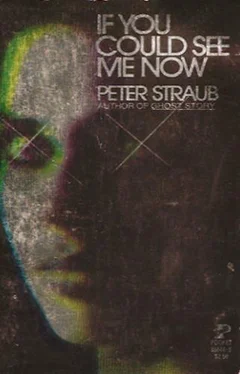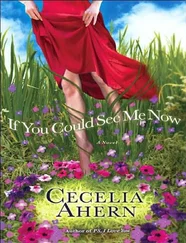One of them noticed me, and his cigarette had frozen in mid-arc to his mouth. He muttered to the man beside him, and I could read the three syllables of Teagarden on his lips.
When I reached the concrete walk to the church steps, I here and there recognized a face, and greeted the first of these. “Good morning, Mr. Korte,” I said to a squat bulldog-like man with a crewcut and heavy black glasses. Bud Korte owned a farm a mile or two down the valley from the Updahl land. He and my father had often gone fishing together.
“Miles,” he said, and then his eyes shot wildly away toward the cigarette he was pinching between two fingers the size of small bananas. “Howdy.” He was as embarrassed as a bishop just greeted familiarly by a hooker. “Heard you was back.” The eyes shot away again, and landed with painful relief on Dave Eberud, another farmer I recognized, now looking in his, horizontally-striped shirt and plaid trousers as if his Mother had dressed him in too much haste. Eberad’s snapping turtle face, twisted slightly in our direction, snapped forward. “Gotta have a word with Dave,” said Bud Korte, and left me examining the shine on my shoes.
Duane, in his double-breasted suit, its jacket unbuttoned to reveal wide red braces, stood halfway up the church steps; his posture, one foot aggressively planted on a higher step, his shoulders brought forward, plainly said that he did not want to acknowledge me, but I moved toward him through men who drew together as I passed.
When I began to go up the steps I could hear his voice. “… the last auction. How can I wait it out? If beef goes down below twenty-seven a pound, I’m through. I can’t raise all my own feed, even now with that new land, and that old M I got is fallin’ apart.” Looming heavily beside him was Red Sunderson, who stared at me, not even bothering to pretend to listen to Duane’s complaints. In the sunlight., Sunderson looked younger and tougher than he had at night. His face was a flat angry plane of chipped angles.
He said, “We’re mighty fancy today, Miles.”
Duane irritably glanced at me, and then shifted his cocked leg. The sunburnt part of his face was unnaturally red. “I considered we might see you here sometime.” But it’s too late now, his tone said.
“I said, we’re mighty fancy today.”
“It’s all I brought with me besides jeans,” I said.
“Ma says you finished playing with that old furniture.”
Duane made a disgusted, angry sound with his lips. Behind me, a man drew in a hissing breath like a secret laugh.
“What’s an old M?” I asked.
Duane’s face became a deeper shade of red. “A goddamned tractor. A goddamned tractor with a busted gearbox, if you wanta know. Since you’re through wrecking my furniture, maybe you’d like to junk up my tractors too, huh?”
“Been in the woods lately, Teagarden?” asked Red Sunderson. “Been gettin’ any up in the woods?”
“What’s that about the woods?” asked my cousin. Red was still staring at me from his flat chipped face incongruously mounted with his mother’s blobby nose.
Some tribal signal was drawing the men at the bottom toward the steps; at first I thought they were coming for me, but when the first shouldered past without looking at me, I knew that the services were about to begin, and it was time to rejoin the women. Red turned away as if he could no longer bear to look at me, and I was left with redfaced furious Duane. I said, “I have to talk to you about something. About Alison Greening.”
“Hell,” he uttered, and then, “Don’t you sit with me, Miles,” and stomped up the stairs with his friends.
I could hear them whispering as I followed them into the church. By either gossip or telepathy, they all knew who would be the last man to enter the building, and the women were all craning their necks to look at me. On several of their plain country faces, I caught expressions of horror. Duane went his shovel-handed way down to the right aisle. I went to the left, already sweating through the tailored shirt.
Halfway up toward the front I slid into a pew and sat down. I could feel their faces pointing at me white and red, and tilted my head back and examined the familiar interior. White arched wooden ceiling, white chaste walls, four stained-glass windows on either side with Norwegian names at the bottoms: in memory of Gunnar and Joron Gunderson, in memory of Einar and Florence Weverstad, in memory of Emma Jahr. Up in Bertilsson’s sanctuary behind the altar, a huge sentimental painting of Jesus anointing St. John. A while bird like one of the town hall pigeons hovered above the pale symmetrical face.
When Bertilsson popped like a figure on a German clock through his entrance at the front of the church, he unerringly looked at me first. The telepathy had reached him too. After that, much standing up and sitting down, much responsive reading, much singing. A wizened woman in a purple dress gave abrupt, unmusical accompaniment on a small organ. Bertilsson kept watching me with oily eyes: he seemed to brim with a generalized emotion. His ears were very red. The four or five other people in my pew had moved farther and farther away from me, taking advantage of all the standing and sitting to shift a few inches each time.
My shirt felt like paper about to shred; a fly buzzed angrily, obsessively, somewhere up near the ceiling; whenever I leaned back, I stuck to the wood of the pew. Above the blond wood of the pew before me protruded a boy’s vacant face, regarding me with dull eyes and open mouth. A drop of saliva hung on the full part of his lower lip.
After “O God Our Help in Ages Past” Bertilsson motioned for us to sit, using the gesture with which an actor silences applause, and moved to the pulpit. Once there, he deliberately removed a handkerchief from his sleeve, dabbed his shiny forehead, and replaced it. More time-wasting while extracting his sheaf of notes from within his loose garments. All this time, he was looking directly at me.
“The text for the day,” he said, his voice light and confidential, “is James II, verses one to five. ‘My brethren, have not the faith of our Lord Jesus; Christ, the Lord of glory, with respect to persons. For if there come into your assembly a man with a gold ring, in goodly apparel, and there come in also a poor man in vile raiment… ‘ “
I tuned him out and let my head fall forward, wishing that I had not taken Polar Bears’ advice. What good could come of this? Then I was needled by a sharp awareness that Polar Bears had told me something far more important — a fact that connected to another fact. It was like a thorn in my side, nagging at me. I tried to go over the conversations I’d had with Hovre, but Bertilsison’s sermon kept breaking in.
He had managed to wrestle the Good Samaritan into James II, I noticed, quite a feat even for someone as glib as Bertilsson. It seems the Samaritan was not a superficial respector of persons. “But this works in reverse, my friends.” I looked up at his odious, glistening moonface and silently groaned. He was still fixing me with his eyes. “Yes, my friends, we must not condemn the Samaritan to seeing but one side of this coin.” I closed my eyes.
Bertilsson rolled on inexorably, and it was only his pauses while he rummaged for the ripest vocabulary that told me he was improvising. I looked up and saw him folding his notes, unconsciously making them into neat square packages with sharp edges. The boy before me permitted his chin to drop even further.
Then I realized what Bertilsson was going to do, and he did it while I witnessed the malice leaking from the glistening eyes and the rolling voice, “Is not there one among us in fine raiment, one who cannot hide his anguish beneath fine clothing? Is not there one among us needful of the Samaritan’s touch? A man in pain? Brethren, we have with us a man sorely troubled, who imagines life not God’s gift, as we know it to be. A sparrow’s life, a child’s life, all are precious to Him. I speak of a man whose whole soul is a cry of pain, a cry to God for release. A sick man, my brethren, a man sorely ill. My friends, a man in need of our Christian love…”
Читать дальше












